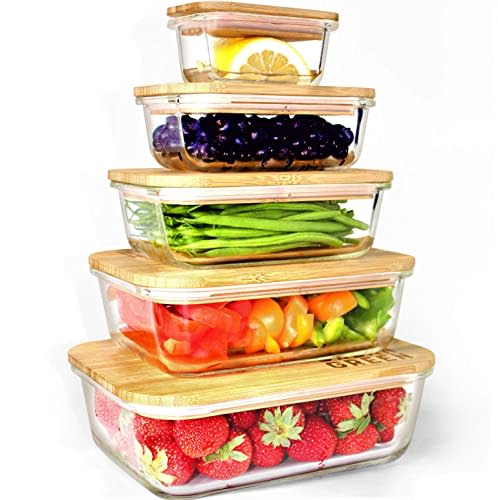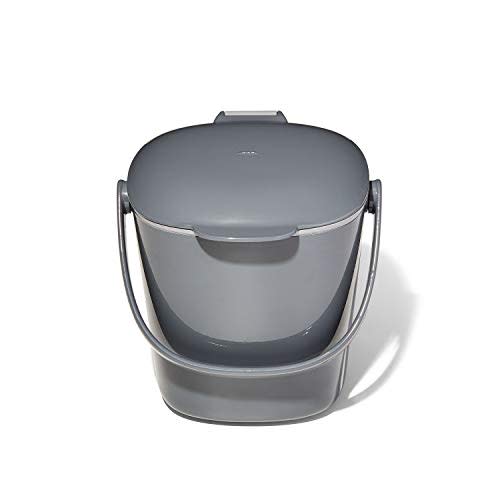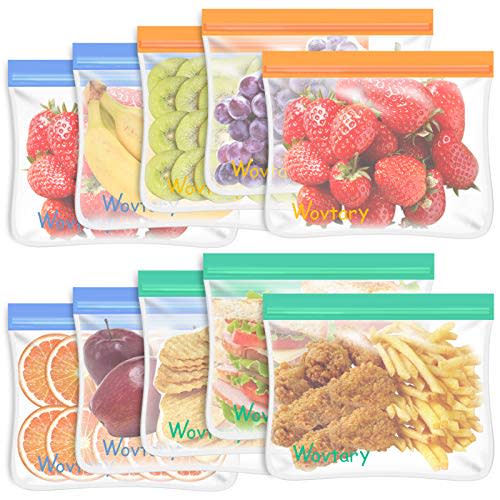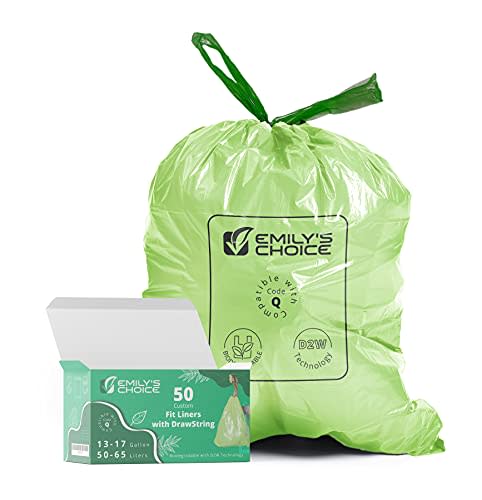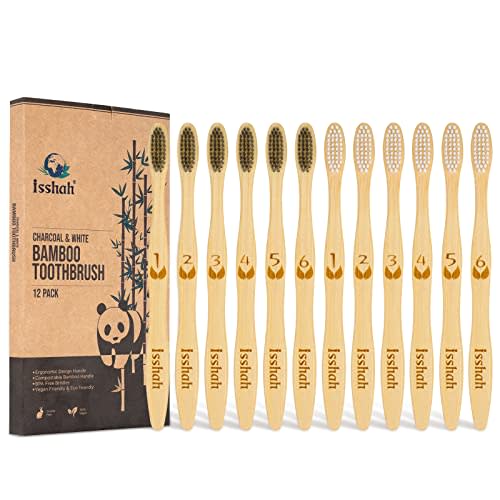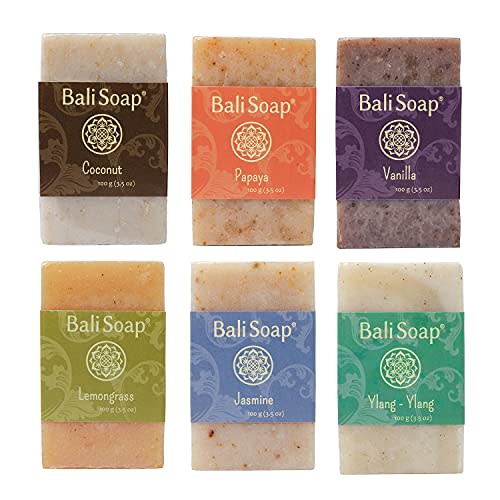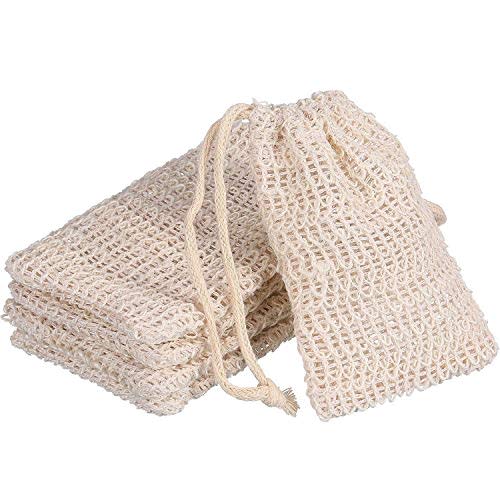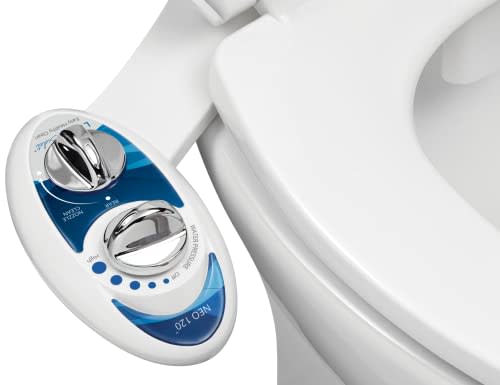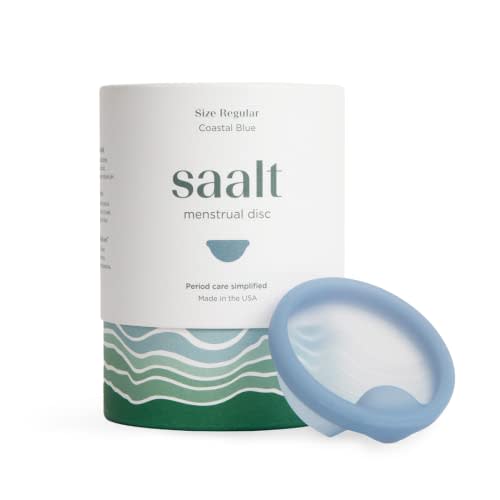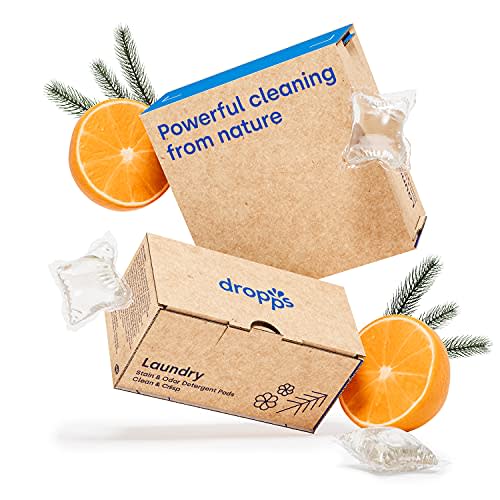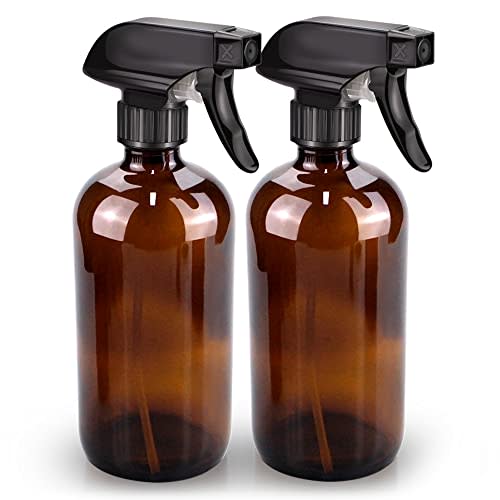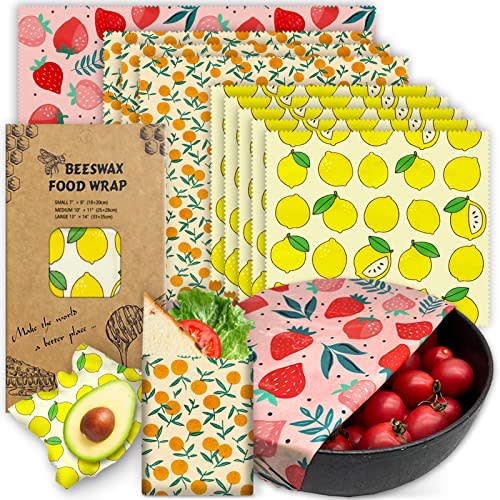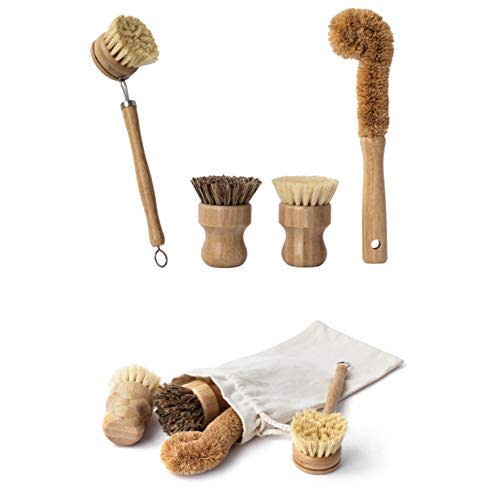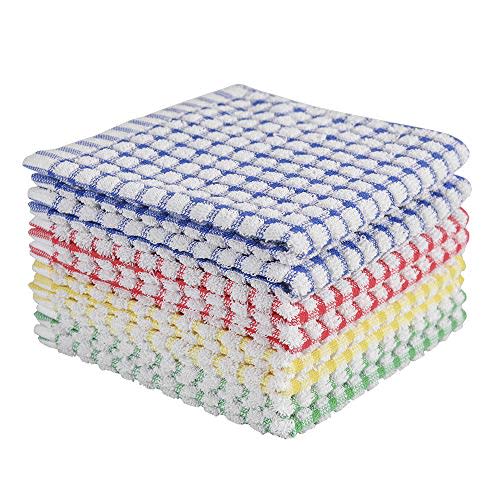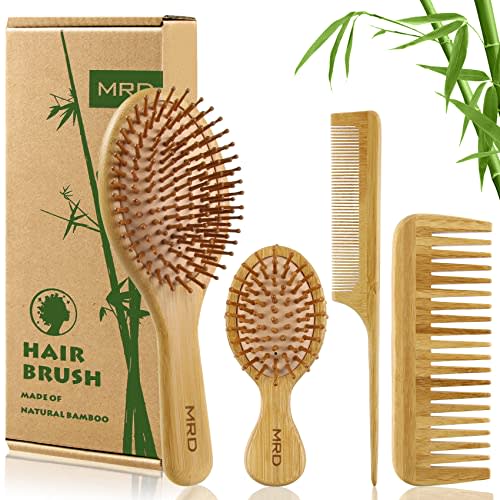54 of the Best Ways to Live That No-Single-Use-Plastic Life
Eliminating single-use plastic doesn't have to be difficult.
Sometimes it feels like our society is just starting to figure out that plastic isn't great and eliminating single-use plastic should be the goal. Like, really—all plastic is pretty terrible. It ends up in our oceans, kills our wildlife, plants and natural habitats, emits dangerous greenhouse gases that exacerbate global warming, and somehow, even makes its way back into our own bellies as microplastics. Say it with me: Gross.
But single-use plastic in particular is some of the worst stuff on (and for) the planet. If you're new to the sustainable living game, single-use plastic is a plastic item specifically designed for a single-use.
So, for example, you use a sandwich baggie to house your lunch, remove the sandwich, and throw away the baggie. #SingleUsePlastic. You grab a plastic bag at the store to bag your fruits and veggies. You bring the produce home in the bag, then throw out the bag. #SingleUsePlastic. You're parched while out in public so you visit the nearest vending machine and buy a bottle of water for $3. Once you finish the water, you throw out (or even recycle!) the bottle.
It's still #SingleUsePlastic even if you throw it in the recycling bin, as even correctly-recycled single-use plastic can find its way into our oceans and also doesn't break down in landfills for hundreds of years.
Related: ‘There Is No Planet B’—75 Earth Day Instagram Captions To Inspire Change
So, how can you break this single-use plastic cycle? By reading up on the best plastic-free tips and tricks.
Here at Parade.com, we're all about sharing products we love with our audience. When you make a purchase on an item seen on this page, we may earn a commission, however, all picks are independently chosen unless otherwise mentioned.
Here Are the 50 Best Tips and Tricks for Eliminating Single-Use Plastic:
Tips for Getting Started on a Plastic-Free Life
More and more stores are banning plastic bags (or by "banning" we mean, charging for them too). If you want to help the planet and also save yourself the five cents for a plastic bag at the store, bring your reusable tote bags whenever you go shopping.
Reusable tote bags aren't the only way to cut down on plastic when shopping. Did you know that single-use produce bags aren't the only option you have at the grocery store? Sure, it's the option food stores provide in the produce section, but you can actually bring your own reusable produce bag to most grocery stores and they'll honor it. "One of the best alternatives we use is reusable produce bags," says Hayley Tillard, Co-Founder and Director at EcoLust. "The ones we get in particular are made from recycled plastic bottles and are mesh with a drawstring. They are super light so they won't add too much weight when buying fruit and veg and because they are mesh they allow the produce to breathe and you can wash your haul while they are still in the bag. They also are great for hiking, you can fill one with nuts, seeds, lollies and chocolate to keep your energy levels up."
Now for tip #3. Once you invest in a few reusable mesh produce bags and reusable tote bags, make sure to leave them in your car or somewhere where you will remember them. There's nothing more annoying than getting to the grocery store and realizing you don't have your reusable bags. #SustainableLivingFAIL!
"Being prepared at all times is something I have learned the hard way, multiple times," Tillard says. "Going to a restaurant, you would think you wouldn't need to bring your reusable cutlery but some places only serve plastic cutlery. Having a reusable straw, cutlery, and tote bag can help you avoid almost any situation when you are out and about."
View the original article to see embedded media.
Tip #5 is invest in compostable cutlery and keep it on you at all times (in the car, in a bag, etc.). When eating out, you'll also want to bring a tote bag and sustainable to-go container—those are tips #6 and #7. If you end up bringing leftovers home, you'll avoid the single-use plastic often involved in takeout by instead bringing your own sustainable container and tote bag to carry it in. For sustainable containers, glass, silicone or stainless steel are better reusable options than plastic.
Urban Green Glass Containers with Bamboo Lids, Meal Prep Glass Containers, Glass Food storage Containers, 5 Pack, Pantry & Kitchen Glass Organizer, Lunch glass container, Microwave Oven Freezer Safe
While you're at it, you may want to throw a reusable, sustainable straw into that tote bag too. Reusable straws can be made from many different materials including glass, stainless steel and even bamboo.
Related: The 10 Best Metal Straws on Amazon
Speaking of a to-go tote, keeping a tote of all the to-go zero-waste essentials will do wonders whenever you find yourself traveling or even while running errands. "Bringing a reusable tote bag packed with travel cutlery, a reusable water bottle, a travel cup, and produce bags can help you avoid much of the single-use plastic waste that pollutes our oceans, landfills, and ground waters," says Gonzalez. Throw a straw in there and you won't accidentally find yourself trying to drink a smoothie as if it's water.
View the original article to see embedded media.
Speaking of water, you'll want to avoid single-use plastic water bottles whenever possible. To do this, keep a reusable water bottle on hand at all times. "Instead of buying disposable bottles of water, everyone in my family has their own reusable water bottle," says Addie Fisher of The Old World New. "To fill it up, we use a Brita water filter and recycle the filter cartridges through Brita and Terracycle."
Water filters are a great way to make sure your water is "clean" and devoid of harmful toxins, but in most cases, filters are made from plastic. If you want to ditch plastic 100%, you could choose a charcoal stick. Charcoal sticks naturally detoxify water and each stick can be used for as long as three months each. No plastic and no toxins!
Related: Rub-A-Dub-Dub—Here's a Step-By-Step Process to Cleaning Your Metal Straw
Plastic-Free Tips for the Home
Start slowly. According to Melanie Gonzalez, Founder of Simple Good, "The most important thing to remember when you start your journey to reducing plastic is to do it slowly." Gonzalez has a point—in order to reduce plastic, you have to use it all up first. "Simply throwing away all your plastic actually adds to the plastic waste in our landfills and having to buy lots of new things is costly," she adds.
Give composting a go. It may seem daunting to get into composting, but it's actually even easier than throwing something in the trash. If you have a yard, you can start a backyard compost or if you live in an apartment or residence without yard access, you can invest in an indoor compost bin. Any organic food scraps that would break down on their own—egg shells, veggie and fruit scraps and peels, cardboard egg boxes, paper, and even things like leaves—should be added to the compost.
OXO Good Grips Easy-Clean Compost Bin - Charcoal - 0.75 Gal/2.83 L
Try a silicone sponge in place of a conventional sponge. Not only do silicone sponges have a longer life span—as they can be used for up to one year—but they're also healthier for you, since they're not as porous as traditional sponges. All the nooks and crannies of traditional sponges actually hold onto bacteria longer, which can make you sick and reintroduce the dishes to bacteria.
Say no to plastic baggies of all kinds. Sandwich baggies? You don't need them anymore. A great sustainable alternative to sandwich baggies and freezer baggies are silicone bags. Brands like Stasher, ACCA, and LunchSkins make reusable baggies in snack bag, sandwich, and even bigger sizes. Even better: Silicone bags can be used to cook and can even go in the freezer.
10 Pack Reusable Sandwich Bags Reusable Storage Bags,Reusable Snack Bags Leakproof Silicone - Free Plastic BPA Free Bags for Food Travel
Give biodegradable garbage bags a whirl. Did you know traditional garbage bags actually don't break down? They can't—they're made of plastic! So, how can the garbage inside these bags break down? The answer is it can't either. Even if you throw a banana peel in there. It won't break down inside the plastic bag! That's why it's important to invest in biodegradable bags like Bio Bags, which break down on their own as to give the trash inside a chance to also break down.
Emily's Choice Heavy Duty Biodegradable Tall Kitchen Trash Bag Code Q (50 count) with D2W Technology, Custom Fit Trash Bag compatible with Simplehuman Code Q trash bins, 50-65L / 13-17 Gallons, ATSM 6954,1.2 Mil / 30 Micron Thickness
Plastic-Free Tips for the Bathroom
There's more plastic and single-use plastic associated with your bathroom than you may realize. Did you know your toothbrush is primarily made from plastic? Sure, it's designed for more than single use, but even still, toothbrushes account for 50 million pounds of the trash that sits in landfills in the U.S. Tillard recommends bamboo toothbrushes as an alternative. "Bamboo is a sustainable material and very durable," Tillard says. "When the toothbrush comes to the end of its life, remember to break off the head of the brush with the bristles and throw that in the bin and the bamboo handle can be composted."
Isshah Biodegradable Eco-Friendly Natural Bamboo Charcoal Toothbrushes - 12 Count
Toothbrushes aren't the only mainly plastic item in your bathroom wreaking havoc. Have you ever considered how much plastic it takes to make a razor? And if you keep throwing out your disposable razors, how much waste that equates to? According to the EPA, 2 billion razors are thrown away each year. "Switching from disposable razors to safety razors is a priority," says Gonzalez. "This switch can also save you money since you can buy a great safety razor for under $20 that will last you a lifetime. And because the blades (as well as the razor) are recyclable, we can keep lots of plastic out of the landfill."
Your shampoo, conditioner and body wash are likely packaged in plastic. But how can you avoid plastic packaging when seemingly every brand makes shampoo, conditioner and shower gel in plastic bottles? Two words: bar soaps! Bar soaps aren't just for washing your hands. "A great first step would be to switch to bar soap for your body and hair. Water is the first ingredient in body wash and shampoo and is added by manufacturers so that you run out faster," says Gonzalez. "You can find all-natural soaps that are package-free (and cruelty-free, too) that will last you the equivalent of three medium-size plastic bottles!"
Bali Soap - Natural Soap Bar Green Collection - Bath Soap for Women & Men - Handmade Soap Gift Set - Moisturizing Vegan Soap Bars - 6 pc Variety Exotic Pack, 3.5 Oz each
Related: Eco-Friendly Products That Make It Easy to Be Green on Earth Day (and Every Day)
Here's another tip once you switch to bar soaps. Actually, it's more of a hack, really. "I recommend buying yourself a soap saver sack for your bar soaps," adds Gonzalez. "Soap savers help you prolong the life of the soap by allowing the soap bar to dry out between uses, helps prevent the soap from breaking apart, and ensures you use every last ounce of that soap bar!"
5 Pieces Soap Saver Bag Natural Sisal Exfoliating Soap Pouch for Foaming and Drying The Soap Bars Shower Soap Bag
Say you have curly hair and are wary of bar soaps. Never fear. According to Fisher, the Heali Kiwi shampoo bar by Ethique is a saving grace bar soap for curly-haired humans. "To utilize less plastic in our bathroom, we buy bar soap and shampoo bars. Shampoo bars have been the hardest adjustment because of my naturally curly hair," Fisher adds. "I finally found one that works amazingly for me."
Let's not forget toilet paper and how harmful it can be (especially the chlorine-bleached stuff) for the environment. With TP, you have a few options. First TP tip is that you can buy recycled toilet paper made from a more sustainable material — bamboo. Who Gives a Crap is a TP company that makes sustainable toilet paper and delivers it right to your door without excess (plastic) packaging. Their rolls come wrapped in paper, not plastic, and the cardboard rolls can be shredded and added to the compost.
Now, for TP option #2. Did you know using a bidet actually reduces how much toilet paper you need? Think about it, if the water spray from the bidet washes you off, there's less work for the TP to do. Using a bidet in your bathroom can actually reduce how much you spend on TP by 75 percent according to Business Insider.
LUXE Bidet NEO 120 - Self Cleaning Nozzle - Fresh Water Non-Electric Bidet Toilet Attachment (Blue)
Now we couldn't talk about sustainable bathrooms without discussing sustainable periods. Even if you're a person that has a period, you might not realize how much waste period management takes. National Geographic reports that people in the U.S. bought 5.8 billion tampons in 2018. Since a single menstruator will use anywhere between 5,000 and 15,000 pads and tampons in their life, all of that single-use product (including its plastic applicators and packaging) will inevitably end up in landfills.
So, what sustainable options are out there? "A menstrual cup is another favorite of mine," says Tillard. "This can be intimidating for a lot of women and it was for me too. It is very convenient when traveling and lasts a long time." Since silicone menstrual cups can last up to 10 years, theoretically, one menstruator could only use four menstrual cups in a lifetime as opposed to 15,000 pads or tampons.
Saalt Menstrual Disc - Soft, Flexible, Reusable Medical-Grade Silicone - Wear 12 Hours - Removal Notch - Two Sizes - Menstrual Cup or Tampon Alternative - Made in USA - Lasts 10 Years (Blue, Regular)
If a silicone menstrual cup isn't your cup of tea, another sustainable period management option is reusable cloth pads. "I have now coupled my menstrual cup with some reusable pads just in case of leakage and towards the end of my cycle when the cup is not required," Tillard says. "The brand I use donates a pack of reusable pads to women in need for every purchase." Reusable cloth pads can be thrown in the washing machine.
Plastic-Free Laundry Tips
From the plastic laundry basket to the container our Tide Pods come in (not to mention the toxins and microplastics that may be lurking in traditional fabric softeners and detergents), your laundry routine has a lot of hidden plastic. When it comes to mitigating plastic-use in your laundry routine, let's start with the plastic bottles that detergent generally comes in.
Dropps Stain & Odor Laundry Detergent Pods: Clean & Crisp| Deep Cleans Fabrics | Keeps Clothes Fresh | Prevents Odors | HE | Powered by Natural Plant-Based Ingredients | Low Waste Packaging | 140 Count
"You can buy laundry drops in bulk that are package-free, as well as laundry powder that comes in kraft paper bags," says Gonzalez.
Related: The Last Straw: These Restaurants Are Joining Starbucks in Ending Plastic Straw Use
Even some bulk stores offer laundry detergent. "If you are lucky enough to have a bulk store near you, you will be able to visit and refill your old laundry detergent bottles," says Tillard. "They should have other household cleaners that you will be able to refill there as well. Google will be your friend in finding a store near you!"
And what about our clothes? They, too, contribute microplastics, polluting our water. Gonzalez adds, "Much of our clothing is made from plastic. Synthetic fibers such as polyester, acrylic, nylon and rayon release microplastic fibers into the wash that ultimately wind up in our ground water." Luckily, there's a way to mitigate this issue. "This is especially true if you wash your clothes in hot water." Instead of washing clothes with hot water, use cold water. It also uses up less energy, which means a lesser carbon footprint for you!
Another way to help reduce microplastics in your laundry routine is to buy clothes made from more sustainable fibers. "Try to avoid buying clothing from these synthetic fibers. Clothing made from organic cotton, hemp and bamboo are better choices," advises Gonzalez.
That's not all you can do—washing your clothes with a special filter can help. "There are also special filters like a Guppy Bag that you can put your clothes in to stop microplastics from entering the water."
If the Guppy Bag doesn't suit your lifestyle, give the Cora Ball a whirl. "You can toss a Cora Ball in the wash and it helps to catch microplastics."
Plastic-Free Tips for the Kitchen
Remember that "start slowly" advice? A meaningful way to do that is to be intentional with the plastic in your kitchen as you start to phase it out. "As your plastic kitchen items reach their end of life, try to find different uses for your plastic containers or donate them instead of throwing them away." Examples of repurposing items include using anything (literally, anything) as a planter, turning containers into bird feeders, and so much more.
Gonzalez adds, "And of course, recycle what you can." Not sure how to best recycle old plastic items? There's probably a Terracycle program for that. Terracycle is a nationwide social enterprise with the goal of eliminating waste. Via mail, they accept all kinds of products that normally can't be recycled. And it's free!
Cleaning products are typically packaged in plastic and often contain harmful and toxic ingredients. Bypass both of these issues by making your own green cleaners at home. All it takes is a few simple ingredients. "A huge source of plastic (and toxins!) are kitchen cleaners, since they come in plastic bottles," says Gonzalez. "Try making your own cleaners from essential oils and vinegar, which are [both] naturally anti-bacterial."
Related: Why ‘Quitting Trash’ Can Streamline Your Life, According to Zero-Waste Expert Kathryn Kellogg
Once you make your at-home, non-toxic cleaners, you need a bottle to put them in, right? Skip the plastic bottle at the five and dime and invest in a better, healthier option. "Store the natural cleaners in reusable tinted glass spray bottles to preserve the potency of the essential oils," says Gonzalez. These typically come in blue, green or amber.
Bontip Glass Spray Bottle, Amber Glass Spray Bottle Set & Accessories for Non-toxic Window Cleaners Aromatherapy Facial Hydration Watering Flowers Hair Care (2 Pack/16oz) (Amber)
Reusable containers can save you a lot of waste but even multi-use plastic isn't the best. Luckily, stainless steel is a much more sustainable option. "Preparing lunch for yourself (and your family) also creates lots of plastic waste," says Gonzalez. "Try to eliminate things like disposable snack bags, plastic bento boxes and food storage containers. Stainless steel containers will last you forever and are dishwasher safe."
If you're not into the silicone snack bag trend, there's also another option: cloth snack bags. "Although silicone bags have become popular, I prefer cloth snack bags since they degrade faster in a landfill than silicone," Gonzalez says.
What about all that Saran wrap and tinfoil? That stuff is single-use. You use it once, it goes in the trash. So, if you're looking for a longer-lasting, healthier alternative, beeswax wrap is an excellent option. "Beeswax wraps are a fantastic plastic-free swap for the kitchen, "explains Tillard. "You will never need to buy cling wrap again and they can be used as snack cups for kids, so they are great for school lunches. Buying beeswax wraps can help to support local beekeepers and they can be composted when they are at the end of their life."
Reusable Beeswax Wrap - 9 Pack Eco-Friendly Beeswax Wraps For Food, Organic, Sustainable, Biodegradable, Zero Waste, Plastic-Free Food Storage, 1L Strawberry, 3M Orange, 5S Lemon Patterns
If you're not sure which materials are considered "sustainable," then you should know that bamboo is generally always the more sustainable option. "Bamboo is also a great alternative to plastic," says Gonzalez. "It grows as much as two feet per day and can be grown without chemical fertilizers and pesticides. Unlike plastic, it can be composted and does not take hundreds of years to degrade."
Related: What Is The 'Slow Fashion' Movement Everyone’s Hashtagging On Instagram?
So, what kinds of things could benefit from a bamboo alternative? If silicone sponges aren't your style, Gonzalez recommends replacing your sponge with a pot scrubber made from bamboo or other sustainable materials like coconut wood or agave. "These sustainable alternatives are super affordable, highly effective and will not wash microplastics down the drain and into our ground water."
Earth's Own Natural Bamboo Dish Scrub Brush 4 Piece Set - Made From 100% Natural Bamboo -Natural Bristle - Plastic Free Dishes Scrub Brush For Dishes, Pot, Pans.
Another great rule to live by in the kitchen is to focus on the "reuse" part of "reduce, reuse, recycle." You know, rather than the "recycle" part that everyone seems to harp on. Recycling actually isn't the way—reducing and reusing can make much more of an impact. That's why Fisher likes reusing glass jars. "One of my favorite ways to avoid plastic is to reuse glass jars that were once full of honey, alfredo, pickles, etc.," she says. "They are great for storing leftovers or bulk foods. By reusing these jars, I don't have to continuously buy plastic storage containers that eventually go bad or go missing."
Stop buying paper towels. Sure, they're not plastic, but they certainly are single-use. Instead, invest in something called "un-paper towels," which is basically the reusable version. They're made from bamboo and can be washed many times before the end of their life.
If un-paper towels aren't your jam, take a hint from Jules Hunt, Founder of Om and the City. "First I'd like to say I don't think plastic is necessarily evil. It has allowed us to advance in society and it's great for items we need to be long-lasting and durable," Hunt says. "With that said, when it's treated as disposable and is thrown away within a matter of seconds, that's where it has become a big issue. I'm proud to say we've virtually eliminated most single-use household items. Instead of paper towels, we use cotton dish rags to clean surfaces."
Oeleky Dish Cloths for Kitchen Washing Dishes, Super Absorbent Dish Rags, Cotton Terry Cleaning Cloths Pack of 8, 12x12 Inches
Also stop buying paper napkins. "But it's paper, right?" A lot of paper napkins are actually bleached, which means they won't break down since they've been treated with toxic chemicals. Buy cloth napkins instead or you can even make your own napkins out of t-shirt or old towel scraps. Get crafty with it!
And what about all the plastic packaging that comes with grocery shopping? According to Hunt, making certain things at home can really help you cut down on waste. "I like to make my own nut milk and nut butters to avoid plastic packaging, but when I do purchase these items, I typically go for the glass container."
Remy Park, creator of @veggiekins, also offers: "If there is something you need to purchase that comes in unavoidable packaging, consider buying the largest size available. Often, this creates less waste than purchasing five smaller sized packages of the item."
"If you're interested in composting, but don't have access to a building compost program or your own bin, store food scraps in a bag in the freezer," she adds. "This will keep any food odors out of your kitchen and also keeps your trash smelling a lot fresher in general."
Plastic-Free Tips for the Bedroom
"There's not much plastic in my bedroom, right?" Wrong! The first tip to reducing plastic in the bedroom is to take survey of what you have. What's in there that's plastic or single-use? Maybe a tissue box, a hairbrush on your dresser, phone chargers—even your sheets might be made of microplastics. So, where do you start?
In lieu of tissues, you can try three other options. First, Who Gives a Crap also makes "forest-friendly" tissues, also made from 100% bamboo.
If you'd rather try a reusable option, you can make reusable, washable hankies from old t-shirts or other scrap fabric.
And if that doesn't work for you, you can always repurpose some of those un-paper towels and use them to blow your nose in 'em!
Now, let's talk phone accessories. Your phone's charger is likely made from plastic and while it's not single-use, there are more sustainable options out there. Nimble For Good is a sustainable company that makes phone accessories like wireless chargers, phone cases, and more out of materials like hemp, recycled plastic and corn. Even their packaging is 100% made from recycled scrap pulp paper.
"Not directly for the bedroom, but [this is] bedroom related," says Tillard. "You can use an old pillowcase as a bread bag. Take it to your local bakery and ask them to put the bread in the pillowcase instead of a plastic bag." Whatever works, right??
What about your sheets, pillowcases and comforter? Are they sustainable too? It depends on what materials they are made with. Buffy makes sheets and other bed accessories out of eucalyptus; organic cotton, wool, linen, satin, silk are generally regarded as sustainable materials. Note: silk and wool are not vegan options.
Have you ever stopped to wonder what your hairbrush is made out of? What about the packaging your cosmetics come in? Chances are the answers are plastic and plastic. Ugh.
There are some sustainable hairbrushes on the market that are made from bamboo rather than nasty plastic. Just make sure the bristles are also made from bamboo too.
MRD Hair Brush Set, Natural Bamboo Comb Paddle Detangling Hairbrush, Wide-tooth and tail comb No Bristle, suit for Women Men and Kids Thick/Thin/Curly/Dry Hair Gift kit
As for your makeup, a lot of makeup comes in plastic packaging. If you're looking to make the switch to some plastic-free cosmetic brands, the good news is they definitely exist. They're just generally lesser-known because many plastic-free cosmetics aren't available in big beauty stores like Ulta or Sephora. Brands like Axiology, Elate, Antonym and Kjaer Weiss offer sustainable packaging and non-toxic makeup thanks to either recycled aluminum, bamboo or glass packaging.
And for the 52nd tip, you can eliminate a lot of paper waste by simply opting out of bills by mail. Simply switch your car bill, electric bill, insurance bill, phone bill, and any other monthly bill to the online option. That'll cut down the mail waste you get by a lot and you can feel good about paying your bill online, all while helping the environment!
That's a whole lot of sustainable tips and while it might seem overwhelming, remember that the goal isn't to do zero waste perfectly. It's for a whole lot of people to try. Even imperfectly!
"All in all, I do my best to avoid single-use plastic by planning ahead, anticipating, and understanding my daily habits and needs, and slowing down so I can be more aware of my actions and impulses," says Hunt. "I'm far from perfect and I realize I am privileged to be able to have the money, time, and resources to consider the environment. We have to realize perfection isn't the goal and that strength lies in numbers... So the more of us making imperfect efforts is what really makes a difference."
Next up, find out why millennials are thrifting their gifts—and the best secondhand gifts to give!
